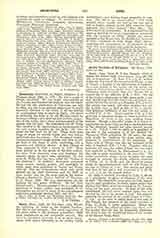

Anna. —September “Anna; R. V. has Hannah, which is nearer the Hebrew, graciousness, from Hanan, to be gracious. (I) Anna (I K., i—ii, 21), mother of Samuel, was one of the two wives of Elcana, a man of Ramah, a Zuphite of the hill-country of Ephraim. As a true woman of her nation, she felt keenly the reproach of barrenness, all the more so that her rival, Phenenna, more favored than she, did not fail to remind her of her affliction (I K., i, 6-7). On one of the family’s pilgrimages to Silo, Anna made a vow that, should God bless her with a son, she would consecrate him to His service as a Nazarite (I K., i, 9-11). Her prayer was heard, and after weaning her son, she brought him to Hell in Silo (I K., i, 24-28). This generous fulfilment of her vow was amply rewarded (I K., ii, 21). Anna’s canticle (I K., ii, 1-10) gives rise to questions similar to those regarding the Magnificat, to which it has some striking resemblances. Though a beautiful psalm, it is found inappropriate on Anna’s lips, having no special reference to. her situation, beyond the quite general remark in v. 5b. Unless v. 10b be taken as a prophecy of the rise of the monarchy or of the Messiah (cf. Vigouroux, Bible polyglotte, II, 295 note), the canticle would be, whatever its more precise date, posterior to establishment of the monarchy. (2) Anna, wife of Tobias, was, like her husband, of the tribe of Nephtali (Tob., i, 1-9). Together with her husband and son, also called Tobias, she was taken into captivity to Ninive by Shalmanaser (i, 2, 11). Her role is quite secondary in the narrative. Her rather passionate nature serves to bring out more strongly by contrast the deeply religious character of Tobias (cf. ii, 19-23 and the beautiful prayer which his misunderstanding with his wife brings on the lips of Tobias iii, 1-6). Her sincere and solicitous love for her son is well expressed in v, 23-28; x, 1-7; xi, 5 (cf. the remark above).
(3) Anna is carefully described by Luke, ii, 36-38, as a prophetess, daughter of Phanuel, of the tribe of Aser. The biographic notes given by Luke regarding the aged prophetess, of whom legend knows that she had had Mary under her tutelage in the Temple, bring out her great sanctity. In spite of her early widowhood, she had never married again, but had devoted her life to the service of God. She answers perfectly the portrait of the model widow of I Tim., v, 5-9. As she used to spend most of her time in the Temple, her presence at the scene narrated in Luke, ii, 25-35, is easily understood. Hence her praise to God, the subject of which was Jesus, with the burden that He was the longed-for Redeemer, (4) Anna is also the traditional name of the mother of the Blessed Virgin Mary.
EDWARD ARBEZ

